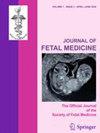Knowledge and Attitude of Young Married Women Regarding Congenital Anomalies in the Fetus: A Cross-Sectional Questionnaire-Based Study from South-Central India
IF 0.2
Q4 OBSTETRICS & GYNECOLOGY
引用次数: 0
Abstract
Abstract Background Although congenital anomalies are a significant cause of neonatal mortality and morbidity in both developed and developing countries, middle- and low-income countries, including India, account for approximately 95% of all children born with congenital anomalies. Some birth defects/congenital anomalies are preventable, if their risk factors are modified. Young married women must have a good knowledge regarding these preventable risk factors because this is the population who will be bearing children in the near future. Therefore, this study aims to determine the knowledge and attitude of young married women regarding congenital anomalies/ birth defects, their risk factors, preventive measures, and treatment options available. Materials and Methods An analytical cross-sectional study was conducted in a tertiary care center in South-Central, India, for over 1 year. Five hundred young married women (range: 18–30 years) answered a questionnaire, mainly focusing on what are birth defects, what are their risk factors and preventive strategies against them. It also included questions on how birth defects are diagnosed, and if carrying a baby with birth defects, what they would do for their management and also their knowledge regarding fetal medicine centers and fetal medicine specialists. Results The mean knowledge score of the study participants was 18 ± 4.08 (range: 8–27). About 82.8% of the study participants had average knowledge regarding birth defects, and only 17.2% had good and adequate knowledge scores. The knowledge regarding risk factors is grossly inadequate. The knowledge regarding advanced maternal age, maternal obesity, and consanguinity as risk factors for congenital anomalies was deficient in more than 50% of the study population. The mean attitude score was 4.42 + 0.985 (range: 1–7), indicating overall positive attitudes. Conclusion Knowledge regarding birth defects, their risk factors, and preventive strategies was moderate in the majority of the study participants. Education has some bearing on the knowledge and attitude, but the knowledge base still seems to be influenced by religious beliefs. Awareness campaigns to increase the knowledge about preventable causes of birth defects and their management strategies are urgently needed in this region.印度中南部年轻已婚妇女对先天性胎儿畸形的认识和态度:一项基于横断面问卷的研究
摘要背景 尽管先天性畸形是发达国家和发展中国家新生儿死亡率和发病率的重要原因,但包括印度在内的中低收入国家约占所有先天性畸形儿童的95%。一些出生缺陷/先天性畸形是可以预防的,如果它们的风险因素得到改变的话。年轻的已婚妇女必须对这些可预防的风险因素有很好的了解,因为这是在不久的将来要生孩子的人群。因此,本研究旨在确定年轻已婚妇女对先天性畸形/出生缺陷、其风险因素、预防措施和可用治疗方案的认识和态度。材料和方法 在印度中南部的一家三级护理中心进行了一项为期1年的横断面分析研究。500名年轻已婚女性(年龄范围:18-30岁)回答了一份问卷,主要关注什么是出生缺陷,她们的风险因素是什么,以及针对她们的预防策略。它还包括如何诊断出生缺陷的问题,如果怀的是有出生缺陷的婴儿,他们会为他们的管理做些什么,以及他们对胎儿医学中心和胎儿医学专家的了解。后果 研究参与者的平均知识得分为18 ± 4.08(范围:8-27)。大约82.8%的研究参与者对出生缺陷的了解一般,只有17.2%的人有良好和充分的知识得分。关于风险因素的知识严重不足。超过50%的研究人群缺乏关于高龄产妇、产妇肥胖和血亲作为先天性畸形危险因素的知识。平均态度得分为4.42 + 0.985(范围:1-7),表明总体上的积极态度。结论 大多数研究参与者对出生缺陷、其危险因素和预防策略的了解程度适中。教育对知识和态度有一定的影响,但知识基础似乎仍然受到宗教信仰的影响。该地区迫切需要开展提高认识运动,以增加对可预防的出生缺陷原因及其管理策略的了解。
本文章由计算机程序翻译,如有差异,请以英文原文为准。
求助全文
约1分钟内获得全文
求助全文
来源期刊

Journal of Fetal Medicine
OBSTETRICS & GYNECOLOGY-
自引率
50.00%
发文量
26
期刊介绍:
Journal of Fetal Medicine is the official journal of the Society of Fetal Medicine affiliated with International Society of Ultrasound in Obstetrics & Gynecology. This is a peer-reviewed international journal featuring articles with special interest to fetal medicine specialists, geneticists and ulstrasonologists. The aim of the journal is to communicate the results of original research in the field of fetal medicine. It includes a variety of articles suitable for clinicians and scientific specialists concerned with diagnosis and therapy of fetal disorders. All articles on health promotion of the fetus are acceptable for publication. The major focus is on highlighting the work that has been carried out in India and other developing countries. It also includes articles written by experts from the West. Types of articles published: - Original research articles related to fetal care and basic research - Review articles - Consensus guidelines for diagnosis and treatment - Case reports - Images in Fetal Medicine - Brief communications
 求助内容:
求助内容: 应助结果提醒方式:
应助结果提醒方式:


